'We're having a sustainable Christmas'
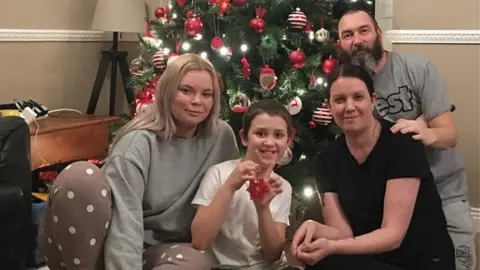 Natalie Rees
Natalie ReesLots of people want to be more green, and retailers are increasingly betting that consumers will shift their spending habits.
While the spirit is willing for most people, changing behaviour is another matter entirely.
But some families have already made the leap, and are cutting back on waste and excess this Christmas, despite coronavirus pressures.
So what's the trick to having a fun, eco-friendly, Christmas that won't break the bank?
More than 90% of people in the UK want to live a sustainable lifestyle, but only 16% are changing their habits to do so, research by analyst firm Gartner suggests.
But coronavirus has accelerated green trends that were already "bubbling under", according to its sustainability lead Jonathan Hall.
People have been feeling they "need to stick together to defeat a common enemy", he says.
Trends towards self-sufficiency and buying locally are also speeding up due to the pandemic, Mr Hall says.
The BBC spoke to two families having a sustainable Christmas for their tips on getting into the green spirit.
Getting organised
Natalie Rees, a sustainable development manager at Transport for Wales in Cardiff, starts preparing early so she can relax in December.
"I usually start preparing for Christmas at the end of August - October at the latest," she says.
Leaving Christmas present buying to the last minute means people rush out and may end up spending a lot of money on a gift that's not well thought-out and may just get chucked away by the recipient, she says.
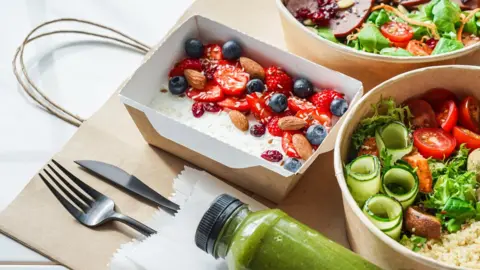 Getty Images
Getty ImagesNatalie also starts planning meals early to avoid buying too much food, and lists people to send e-cards to.
The equivalent of more than four million Christmas dinners are thrown away each year in the UK, according to consultancy Zero Waste Week.
Portion planners are available from charities such as The Waste and Resources Action Programme (Wrap), and, for those wishing to also control their weight, The British Heart Foundation.
Homemade gifts
Green gifts can be more fiddly than grabbing something from a shop. But if you make them yourself, people tend to appreciate it, says Natalie.
"It's something much more special," she says. "A while ago, if people were offering a homemade gift, it would be frowned upon, but now it's much more acceptable."
This year Natalie is making hampers out of spare cardboard boxes, and putting homemade brownies, jams, jars of mincemeat, pickled onions, and pickled cabbage in.
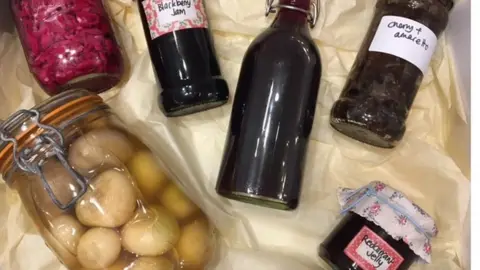 Natalie Rees
Natalie Rees"It's quite cheap," she says. "You can get a red cabbage for 50p and it makes five jars."
She's previously made wrapping paper out of brown paper, she adds.
Wrap says most Christmas cards can be recycled, if you cut the glitter off.
Breaking the bank?
Quite a lot of green products have a premium price tag, but that doesn't mean they are out of reach, says Natalie.
"You can shop around," she says.
A study by comparison site Money.co.uk in March suggested that buying household items such as apples, pasta and shampoo in the greenest possible way was almost twice as expensive as buying non-organic or plastic-wrapped goods.
But Natalie keeps her eyes peeled for voucher code offers in the autumn, and also looks out for Black Friday deals. This year she bought waste-free bars of soap and shampoo bars from a shop in Manchester.
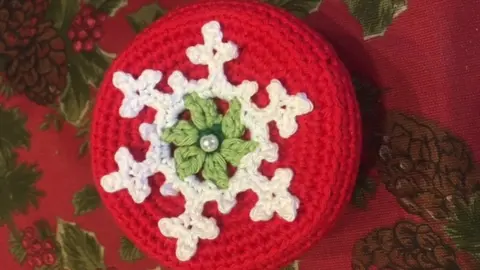 Natalie Rees
Natalie ReesYou can also do deals with friends and acquaintances, she says.
"Last week a lady sent me some crocheted snowflakes and she asked me to make a donation to a charity," Natalie says.
You can buy reasonably priced reusable crackers, or make your own, and put gifts in like cookies or small tins of lip balm, she adds.
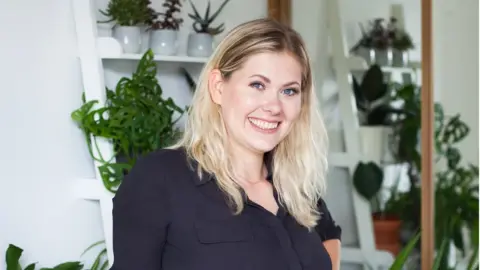 Merje Shaw
Merje ShawMerje Shaw from Hackney, London, has her own green plant firm Scandiscapes. She also doesn't feel it's necessary to spend lots of money on presents.
"I'm Estonian originally," she says. "I didn't grow up rich so we didn't have money to waste."
Her children tend to get "one big present each" she says. "All gifts that can be played with again and again."
She tries to avoid plastic toys, "but when it's things like Lego it evens out because it gets played with for decades," she says.
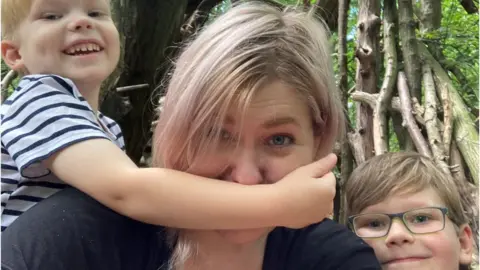 Merje Shaw
Merje ShawLocally-grown
Buying seasonal local produce can help reduce the environmental hit from agriculture and reduce food miles.
The pandemic has meant more people buying locally to avoid mixing in big shops, says Gartner's Jonathan Hall.
Natalie buys from local markets and greengrocers, which she says is cost-effective, and also helps to boost the local economy. Merje also buys food locally.
Natalie also has an artificial tree she's had for about 15 years, which is "not great [for the environment], but the longer you use them, the better," she says.
She looked into getting a rented tree this year, but it wasn't feasible. Another option is to try to get hold of a locally grown tree, she says.
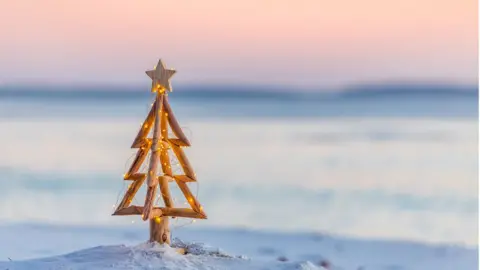 Getty Images
Getty ImagesYou can also experiment. "One of my friends has a driftwood tree this year," she says, while glass bottle trees and even egg carton trees are an option.
Merje looked into renting a tree too, but also decided it wasn't for her.
Even though being green is important to both Merje and Natalie, they both have a budget, and decided that the rental option was just too expensive.
Merje has a tree in a pot, but put it on the roof garden and "now it's so big we can't take it down any more," she says. "It's kind of stuck there. But it looks beautiful."
They bought another tree for the house, which will later be chipped into garden food.
Meat-free menu
Natalie and her family have gone vegan due to the environmental impact of meat production, and so are having a nut roast and vegetable wellington this year.
They don't feel like they're missing out, but for Merje it's enough to cut down on meat and animal products.
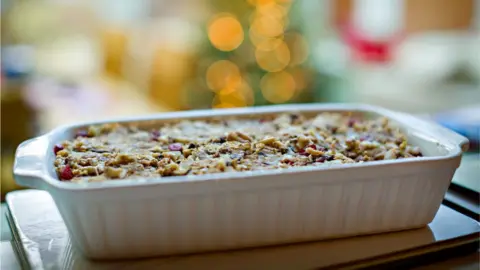 Getty Images
Getty ImagesShe is planning to have locally sourced pork and sauerkraut for Christmas Eve, when Estonians celebrate. "Very Germanic," she says.
"I don't eat that much meat any more, but Christmas seems like a good time."
While there's an increasing number of sustainable products and services, it can be difficult to make the right choices, Merje says.
"You almost have to forgive yourself if you get it wrong," she says.
Merje, who has attention deficit hyperactivity disorder (ADHD), describes herself as the "least organised" person.
But, she says, if you take "sustainability as your default" and gradually build in green habits, "it becomes part of you".
